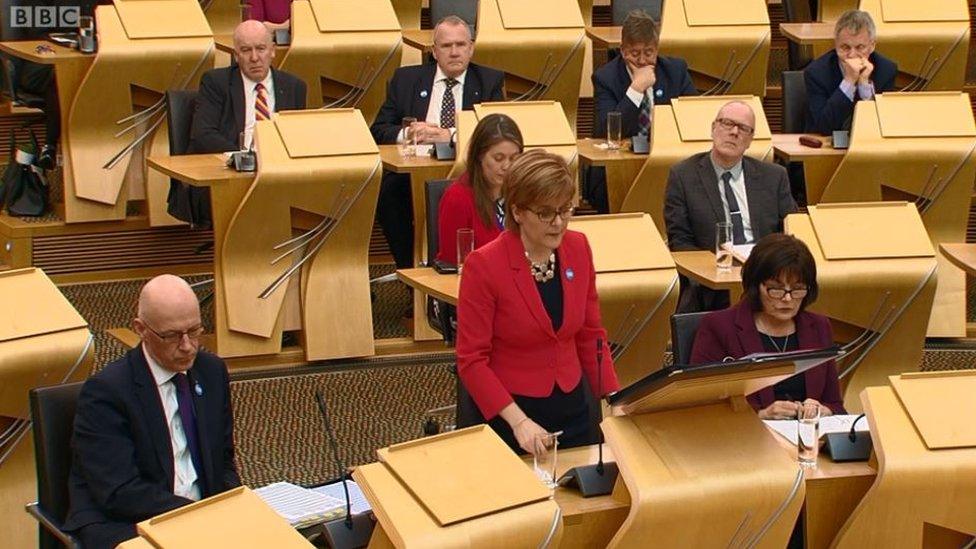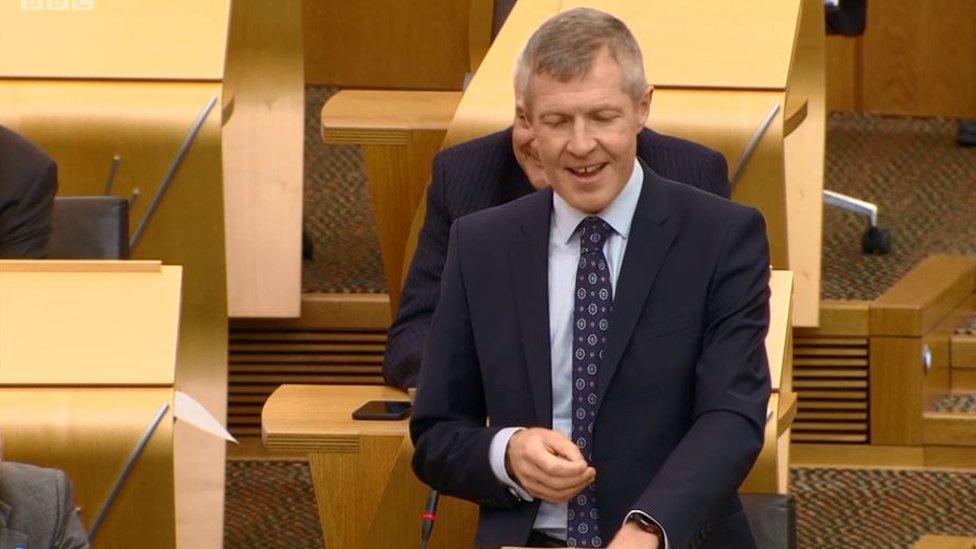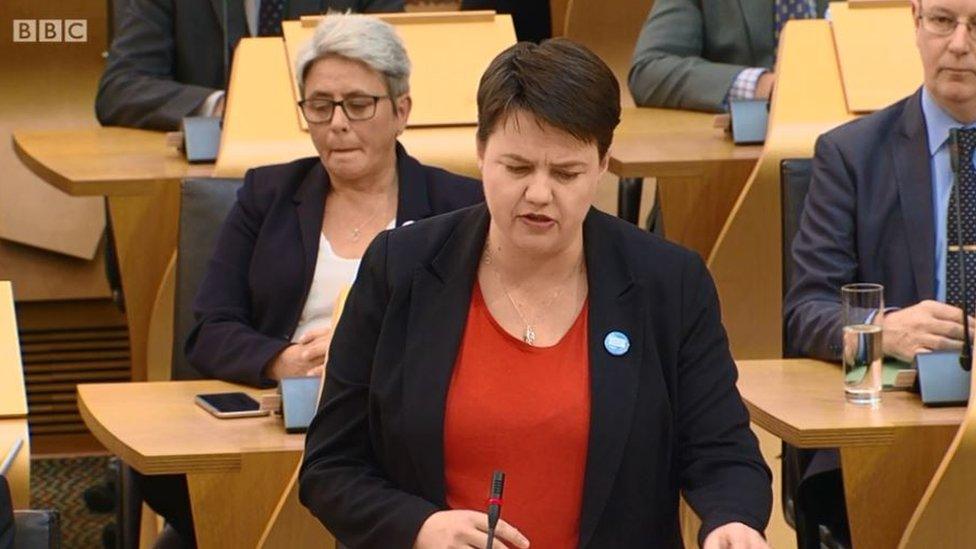FMQs: Flying through the political fog
- Published

Generally, I eschew metaphor. If pursued too eagerly, it can trap the unwary orator into a tortuous comparison, lessening clarity.
However, on this occasion, I shall succumb. The political landscape is shrouded in thick fog, like an airport.
And, today, Nicola Sturgeon resembled nothing so much as an aeroplane circling that fog-beset airstrip, caught in a holding pattern.
She cannot land at a time or on a runway of her own choosing. Her movement, her strategy, is circumscribed by the others in the holding pattern.
What is worse, the connection to Air Traffic Control appears to have been lost. Or, worse still, nobody is entirely certain who is taking charge of the overall situation.
Ok, Brian, enough. Back to the mundane.

Ms Sturgeon will address the SNP conference next week
The first minister was facing Holyrood questions today - and will face her party conference in Glasgow next week.
At that event, she would dearly love to announce that the Brexit terms pursued by her government have finally been accepted by UK and EU negotiators.
She would dearly love to give a precise, clear lead to the faithful as to when independence might be attained, and how.
She cannot do either.
Calm and persistent
Ms Sturgeon and Mike Russell, the Minister for Mitigating Brexit, have been calm and persistent in arguing for the closest possible relationship with the EU, if departure cannot be prevented.
They have argued for the UK and/or Scotland remaining in the single market. They have argued, again with vigour and verve, for sustaining the customs union.
It is not that they have been ignored. Their pleas have obliged the UK government, through successive ministers, to respond, to engage. But they have not been heeded in that their demands have not been met.
Indeed, we have now reached a point where Westminster legislated for withdrawal from the EU without Holyrood's consent, which was presumed to be required under established convention.
From a Westminster point of view, that revised approach perhaps sets a precedent. Once broken, a convention - which is just that, a convention, not a statute - is hard to resuscitate.

Willie Rennie once again urged Ms Sturgeon to back the People's Vote campaign
Then there is independence. To be clear, Ms Sturgeon said she would revisit the concept of indyref2 once there was clarity over Brexit. Which she presumed, at the time of her earlier statement, June last year, would be by the autumn of this year.
That became in the public mind an expectation of a statement on indyref2 this month. I expect Ms Sturgeon to make such a statement. But, given the prevailing fog and absence of clarity, it will be a holding statement, for a holding pattern.
At questions today, Willie Rennie said he was "worried about the first minister". Why such angst from the Lib Dem leader?
Because, he said, the FM was "frozen in indecision". She should break free, he argued, by adopting.. the Liberal Democrats' policy of a self-styled People's Vote.
Said PV features the notion of a further referendum on the terms of Brexit, enabling, in effect, the result from 2016 to be overturned.

This was Ms Davidson's last FMQs before going off on maternity leave
Ms Sturgeon has previously said she would not form an obstacle to such a poll. She went a little, tiny way further today in telling Mr Rennie that she would be "perfectly happy" to see such a ballot.
But she still had one stated objection - which was that Scotland might, again, vote to remain in the EU and, again, find her people taken out of the EU because of the UK-wide preference.
(Her unstated objections are that a People's Vote approach might set a precedent for independence - and that a fair wheen of SNP supporters want to leave the EU.)
Ms Sturgeon dealt with the pitch rather effectively. (Mind you, she has had a bit of practice: Mr Rennie has raised this topic more than once.) With a weary, ironic shake of the head, she said she had long fretted about the Lib Dem leader.
Anonymous letter
Ruth Davidson of the Tories occupied her last question session before maternity leave in pursuing Ms Sturgeon about education - and, particularly, the anonymous letter from a teacher urging ministers to take action about problems in schools.
The letter dealt with such issues as inclusion and the impact on other pupils. But Ms Davidson chose to major on claims that teachers were deterred, by their local authority employers, from raising concerns with Ministers.
The Tory leader fulminated splendidly. Ms Sturgeon repeatedly - and I do mean repeatedly - said that any public sector employee with a grievance should feel free to approach ministers.
And Richard Leonard? He pursued the topic of child poverty, rather effectively. Again, the core of his argument was that Scotland would be all the better if the FM would only listen to him and introduce a £5 uplift in child benefit.
Ms Sturgeon was equally effective - and passionate - in response. Firstly, she urged Mr Leonard to support the full transfer of welfare powers to Holyrood.
Secondly, she noted that £7 out of every £10 in enhanced child benefit would, by sheer arithmetic, go to families where the children were not in defined poverty. Was that the best use of resources? Could not other ways be found?
At which point, the political fog thickened, perceptibly.